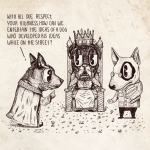Jesus spits on the ground, makes clay of the spittle, and “applies” the clay to the eyes of a blind man (John 9; NASB). The verb behind “apply” is epichrio . Its only other usage in the NT is five verses later, where the NASB translates the very same form of the very same verb as “anoint” (much better than “apply”). At least the NIV is consistently bad, rendering both uses as “put on.” The less patient will be tempted... Read more



















